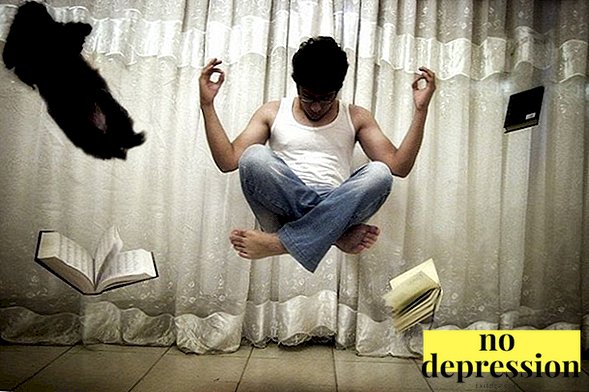As is very often the case in my life, I approach different concepts of world psychology not through books and textbooks, but through my own experiences, personal pain and living experience. It always seems to me that other people's philosophical thoughts and ideas invade my world surprisingly on time, just at those moments when I am ready to open up to them, to see in them a reflection of my own excitements. This happens when I already realized them on my own personal deep level, still not reading anything about them, and is ready to join in the experiences of a person who lived before me and leaked his experience in the images of world culture.

Then I feel a kind of unity, which sneaks me almost to tears, a sense of keen understanding that expands, acquires volume and a clearer form, a certain confidence in his own experience, is no longer lonely, because he found support in his kindred feelings and played with new meanings and facets, found a new verbal form in the arguments of another person.
Jung's “Shadow” sneaked up on me from different sides, lurking, slowly rushing into the doors until I was completely ready. She appeared to me in the lyrics, in conversations of people experienced in psychology, but only by hints, fragments of images. Something already then barely noticeably responded in me simply in response to the very notation of the concept: "What kind of a shadow? Every person has a shadow in the psychological sense, what does this mean?" But this impulse of sudden interest quickly faded away, as if not enough experience had accumulated to attract my interest in the Shadow.
And only when I began to discern my own shadow side more clearly and clearly, to enter into contact with it and dive into it, several phrases about Shadow of Young suddenly came to mind. I thought that this metaphor might be hiding something akin to my own experience and hurried to check.
I opened this door and Shadow burst into my world.
What is a shadow?
Karl Gustav Jung is a Swiss psychologist, the founder of analytical psychology. In the development of his ideas, he often turned both to various religions and to occult movements. It was he who introduced such terms into psychology as "collective unconscious," "anima," and "shadow."
Someone said that the merit of analytical psychology was that it "discovered the existence of the underworld of the human spirit." Freud discovered the unconscious, which contained hidden complexes, hidden injuries and sexual abnormalities. And Jung spoke of the Shadow as the center of our demonic nature.
Shadow follows us everywhere, it is like a "long bag that we drag."
According to Jung, it is not at all the Shadow that is the place where evil is concentrated in man, but rather that which forms it: our expectations, the absence of love in relation to ourselves, abstract ideals, the denial of one’s Self.
What is this Shadow? This is a complex of all our qualities, desires, any personal attributes that we don’t want to recognize in ourselves, which we suppress and deny, which we hate.
If we are accustomed to think of ourselves as a very charismatic person who should be liked by everyone, then all those qualities that contradict this image begin to be embodied in the "Shadow". And if we are confronted with the unfriendly attitude of people towards us, if our charm, our qualities do not cause them the expected delight, then it gives rise to frustration, pain and suffering, which can manifest themselves in hatred of people ("they do not love me, because fools.) We cannot admit that we don’t like all people without exception.
A more vivid example is excessive cruelty towards themselves, as well as sexual deviations on religious grounds. When a person is afraid to recognize himself as an ordinary person, and sees in himself a saint who should be alien to any "low" thoughts, he begins to deny, say, his sexuality, blame himself for her, punish himself for thinking about women, and this can lead to excessive cruelty to yourself or other people.
The shameful and aggressive condemnation by whole religious communities of people or other religious organizations is, according to Jung's followers, a consequence of "crowding out into the collective shadow." Denial and condemnation of something in themselves can switch to the fierce criticism of others, degenerate to the rank of painful and closed selfishness, inability to accept criticism, sophisticated egoism disguised as virtue.
The non-recognition of its shadow side can cause numerous neuroses and psychological problems.
Esse homo
See my shadow changing,
Stretching up and over me.
Soften this old armor.
Hoping I can clear the way
By stepping through my shadow,
Coming out the other side.
Step into the shadow.
Tool - Forty Six & 2 (Aenima)
Jung and his followers say that all this evil is happening, because we are afraid to engage in dialogue with our shadow, to recognize the presence in ourselves of those qualities that we so carefully hide from ourselves.
This does not mean at all that we must realize each of our "shadow" desires. The way to overcome this evil lies on a thin line, like the edge of a razor, which is just as far from unbridled lewdness as it is from hypocritical holiness. This is a fine line of informed dialogue and acceptance.
We must see behind all this piling up of sublime perceptions about ourselves, its, repressed by ideals, social expectations and stereotypes, driven into a corner and rejected. We must love her in the spirit of the Christian virtue itself, because it is a part of ourselves, a part that continues to exist, despite all our attempts to deny it. We must step into this shadow, look into her eyes, recognize her existence.
What can we see inside ourselves? Oh whatever! A small, downtrodden child who wants ice cream to pay attention to him. Tortured by the work of a man who only wants to forget his weekly sleep and do nothing.
From childhood we are embraced by all these ideals (or we form them ourselves): "you must be strong", "everyone wants to be successful and energetic people", "you should always control everything", "you should always have a good mood and motivation ".
And the higher and unattainable these ideals become, the stronger our desire becomes to conform to them, the more the Shadow grows behind our shoulders.
And this Shadow needs simply to be recognized, in attention and love. This requires not only compassion, but also great courage. It’s not so easy to admit to yourself: "In fact, I am not the way I used to imagine myself. I am not so charming, clever, charismatic, righteous."
Refusing to face the truth, we instinctively protect ourselves from the pain that will inevitably arise when the whole gulf of the discrepancies between our self and our expectations is scattered around us. The most offensive insults and attacks against us are, as a rule, arrows shot into our shadow. Violently defending ourselves from criticism, opposing ourselves with anger at those who criticize, in fact, we are trying to defend ourselves from ourselves, from looking into this abyss.
Yes, an awareness of one’s own, sometimes ugly, pitiful, side of personality brings pain. But, having overcome this pain, we gain a state of greater wholeness, unity. This is like a man who, by necessity, began to communicate with his sick-born brother, whose initial disgust was replaced by warm love, since it is flesh from his flesh. (Like the hero Tom Cruise in the movie "Rain Man.")
This wholeness, “finding oneself” is the source of acceptance, honesty in front of oneself, compassion for oneself and for other people, self-confidence in the end! Through the merging with the shadow of a person boldly asserts itself, manifests and implements, rises from the yoke of expectations and stereotypes, and therefore gains freedom.
Freedom to decide once and for all: “Yes, I am so, damn it! Something I can change in myself, but something not. In continuous development, I accept myself as I am, I follow my own way! ”
It is a movement from hatred and denial, to love and acceptance.
Undeveloped, hidden, crushed by self-conceit Shadow pulls the person back into darkness, rattles with chains and howls in the impenetrable night of the human spirit, ready to torment and torment us. But opening to meet her, sucking herself in, passing into her, merging with her, our self begins to sparkle with all facets of its repressed individuality, embodied in the unity of holiness and vice, strength and weakness, ideal and imperfection. To merge with the shadow is what it means to “find yourself!”
Again, this does not mean embodying your demonic nature, indulging in vice and evil. It means simply to find something in us that we are hiding, to show compassion towards it.
When the shadow came into my life, I felt some kind of greater independence, a willingness to withstand any attacks and criticism and remain unshakable (after all, I already know my weaknesses, who can offend me?), The willingness to go my own way confidently, and not someone else’s road, feeling a certain self, center, unity with its self, love for it.
Jung said:
“The fact that I serve a beggar, that I forgive an offender, that I love even an enemy in the name of Christ, are undoubtedly great virtues. But if I find out that the most insignificant of all, the poorest of all those who ask for alms, the most impudent of all offenders, is simply the enemy sitting in me, that I myself need the alms of my kindness, that I am myself the enemy I want to love, what then? "
And this phrase shook me to the very foundation, all my unformed feelings reached out to her, finding support in it, some kind of solid foundation, an explanation by them themselves.
Indeed, if the most important enemy is sitting in me, then what?



